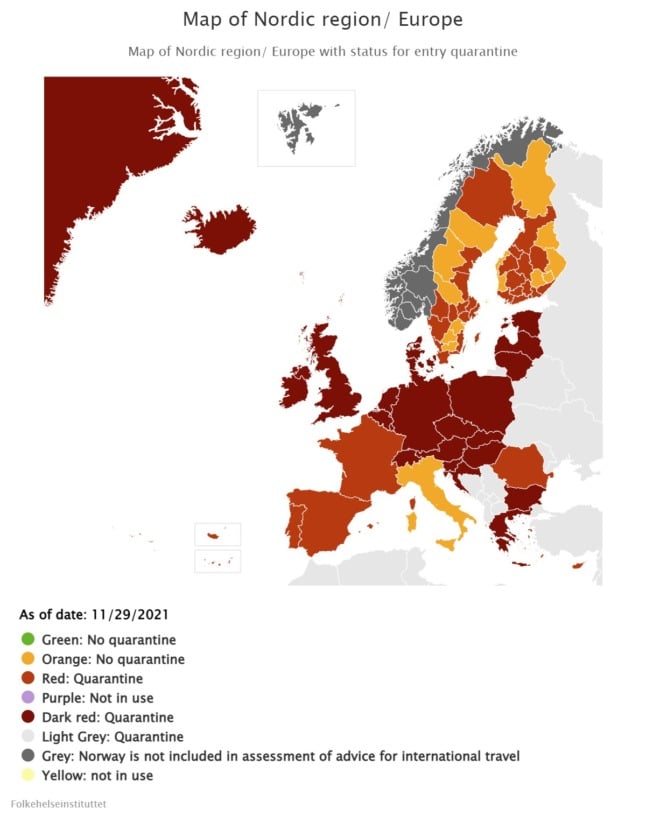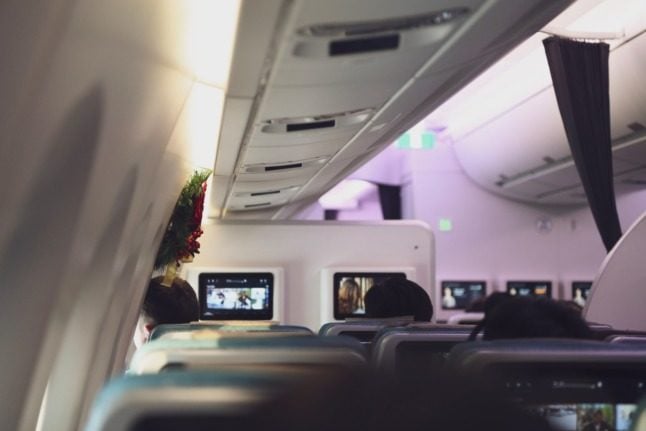Travelling out of Norway
If you’re leaving Scandinavia this Christmas, the most important thing is to keep yourself updated with your destination’s travel rules and restrictions.
Furthermore, you’ll need to be up to date on which health passes are and aren’t accessible to foreigners in order to go to bars and restaurant as the situation varies country to country.
Currently, the Norwegian Government is only advising against travel to South Africa.
Travelling to Norway
For those coming to and returning to Norway then there are several travel rules to be aware of.
We are sure you will likely have heard by now, but Norway has lifted all bans on who can enter the country. Still, testing, quarantine and entry registration rules remain, even for fully vaccinated residents and citizens.
For starters, all travellers to the country will need to register their journey into Norway. This applies to everyone over the age of 16.
Travellers who are not fully vaccinated or haven’t recovered from the coronavirus within the previous six months, or do not have an approved health pass will need to provide a negative Covid-19 test to enter Norway. This won’t apply to those under-18.
Fully vaccinated travellers with an approved health pass do not need to test before departure.
The test can be either a PCR or rapid antigen test and must be taken within 24 hours of arriving in Norway.
Norway currently only recognises health passes compatible with the EU scheme and digital certificates from the United Kingdom and a handful of other non-EEA countries as proof of vaccination or having recovered from the disease. Furthermore, you will only be considered fully vaccinated one week after your final jab.
All travellers, regardless of whether they have been vaccinated or recovered from the virus, will be required to test for Covid-19 after arriving. In most cases, especially if travelling by air, this will be done at the border itself. However, in instances where testing at the border is unavailable then arrivals will need to test within 24 hours. When there are long queues, residents will be sent home with self-test kits. If the test result is positive, it must be confirmed with a PCR test as soon as possible, and no later than within 24 hours.
There’s also quarantine to consider. Currently those who are fully vaccinated or have recovered from the virus in the previous six months aren’t required to quarantine, provided they have an approved health pass and aren’t arriving from one of the eight African countries that requires a quarantine hotel stay.
Those who aren’t vaccinated, haven’t recovered from the virus or don’t have an approved health pass will need to quarantine if arriving from a country that is classified as red, dark red or light grey under Norway’s colour coded classification system.
Almost all countries outside the European Economic Area (EU countries plus Iceland, Liechtenstein, and Norway), apart from the UK, will be listed as light grey.

The Norwegian Institute of Public Health has a webpage and travel map to help travellers stay up to date. Rule changes are typically announced on Friday and come into effect on the following Monday. However, in certain circumstances rules can be announced and come into effect outside of these days.
Travellers may wish to enter a quarantine hotel if they do not have another suitable place to carry out the quarantine period, but they do not have to.
What Covid measures are there in Norway?
Currently, there are several measures in place that will impact people visiting the country. You will need to social distance and wear a face mask in shops, restaurants and other venues, on public transport, in taxis and shopping centres.
Furthermore, the sale of alcohol in bars and restaurants is prohibited nationwide, meaning you won’t be able to have a glass of wine while eating out, for example. A more significant knock-on effect of this is that several businesses may choose to close their doors entirely as the company is not profitable without the sale of alcohol.
This will make it harder to find a place to eat, especially during the week. Restaurants also have to register guests’ contact information in case there is a Covid outbreak, meaning there is a possibility you may need to isolate after being identified as a close contact by contact tracers. This could throw a spanner in the works of any plans to travel home.
Being contact traced could present a problem for visitors, even if they are vaccinated, as there are no exemptions for being jabbed.
READ ALSO: What are the current rules for Covid-19 self-isolation in Norway?
There is also a recommendation that gatherings are limited to 10 guests (20 are allowed on Christmas Eve or one party), although this isn’t legally binding.
Covid-19 health passes certificates aren’t currently being used, but municipalities have the power to implement them. Ski lifts and winter sports activities remain open.
The measures will be in place until mid-January but could be tightened further if the situation requires.



 Please whitelist us to continue reading.
Please whitelist us to continue reading.
Member comments